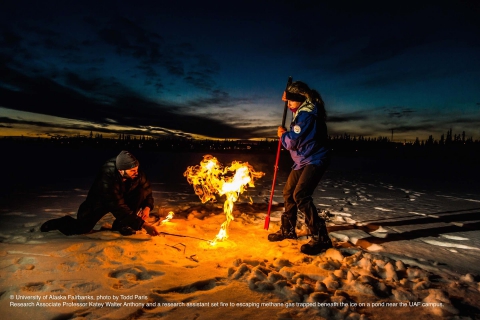
Event Type: Workshop (by invitation only)
Where: Hyatt at Olive 8, 1635 8th Ave., Seattle, Washington, USA, https://olive8.hyatt.com/
Contact: David McGuire, U. S. Geological Survey, University of Alaska Fairbanks, Email: admcguire [at] alaska.edu
NEW: Eos Project Update - 13 March 2018
Citation: Miller, S. M., M. A. Taylor, and J. D. Watts (2018), Understanding high-latitude methane in a warming climate, Eos, 99, https://doi.org/10.1029/2018EO091947.
Web: https://eos.org/project-updates/understanding-high-latitude-methane-in-…
Eos Meeting Report
Citation: McGuire, A. D., B. P. Kelly, and L. Sheffield Guy (2017), Resolving a methane mystery in the Arctic, Eos, 98, https://doi.org/10.1029/2017EO076733. Published on 11 July 2017.
Web: https://eos.org/meeting-reports/resolving-a-methane-mystery-in-the-arct…
Final Workshop Report
Final Report: International Workshop to Reconcile Methane Budgets in the Northern Permafrost Region (PDF - 352 KB)
Citation: McGuire, A.D., B.P. Kelly, L. Sheffield Guy, H.V. Wiggins, L. Bruhwiler, J. Frederick, H. Huntington, R. Jackson, R. Macdonald, C. Miller, D. Olefeldt, E.A.G. Schuur, and M.R. Turetsky. 2017. Final Report: International Workshop to Reconcile Methane Budgets in the Northern Permafrost Region. Arctic Research Consortium of the United States (ARCUS), Fairbanks, Alaska. 14 pages.
Also available through the International Arctic Research Center (IARC) Data Archive at http://climate.iarc.uaf.edu/geonetwork/srv/en/main.home?uuid=e436b77a-b….
Scientific Background
The Arctic Monitoring and Assessment Program (AMAP) carbon assessment published in 2009 highlighted the disparity in methane emissions estimated by extrapolating data from wetlands, lakes, and coastal waters underlain by permafrost (32 to 112 Tg CH4 yr-1) and estimates based on spatial and temporal variability of atmospheric methane concentrations (15 to 50 Tg CH4 yr-1). This difference between bottom-up scaling and top-down estimates has not been reduced in the most recent assessment of methane in the Arctic published by AMAP in 2015. Bottom-up estimates from lakes are thought to be confounded with those of wetlands, and it is important to better distinguish those estimates. At the same time, the amount of methane being emitted from submarine permafrost in the Arctic Ocean and its marginal seas is poorly quantified. Nor do we adequately understand the relative contributions of microbes (i.e., biogenic methanogenesis), fossil sources, and the dissociation of gas hydrates (an ice-like substance formed by methane and water under pressure). The issue of how much methane comes from fossil sources crosses both onshore and marine environments of the permafrost region and includes both natural sources and losses of methane from oil and gas exploration and transport. Top-down estimates of methane emissions from the permafrost region also are highly uncertain, but substantial progress has recently been made by the NASA Carbon in Arctic Reservoirs Vulnerability Experiment (CARVE) campaign in quantifying methane budgets and trends in Alaska. There is an urgent need to better reconcile bottom-up estimates with atmospheric estimates of methane emissions.
Workshop Objectives
- Communicate the state of the science among the three methane synthesis groups;
- Communicate the synthesis plans of each group and progress made to date;
- Identify potential connections to sea ice and land ice;
- Refine synthesis plans based on workshop discussions; and
- Identify a plan for developing an overall synthesis of methane budgets in the region.
Agenda and Participant list
Venue and Travel Logistics
A block of rooms for the workshop has been reserved at the Hyatt at Olive 8. If you are not receiving travel support, please reserve your room here.
- Map and directions
- Airport shuttle, light rail, and other transportation options
 Parking information - (PDF - 475 KB)
Parking information - (PDF - 475 KB) Local restaurants (PDF - 73 KB)
Local restaurants (PDF - 73 KB)
The Seattle link light rail from Sea-Tac airport to Westlake Station downtown is a good option.
Organizers
David McGuire, Co-Lead, US Geological Survey, University of Alaska, Fairbanks
Brendan Kelly, Co-Lead, Study of Environmental Arctic Change (SEARCH), University of Alaska, Fairbanks
Henry Huntington, Facilitator, Huntington Consulting
Charles Miller, Atmospheric Component, NASA Jet Propulsion Laboratory
Lori Bruhwiler, Atmospheric Component, National Oceanographic and Atmospheric Administration
David Olefeldt, Land Component, University of Alberta, Canada
Merritt Turetsky, Land Component, University of Guelph, Canada
Jennifer Frederick, Coastal/Ocean Component, Sandia National Laboratories
Robie Macdonald, Coastal/Ocean Component, Fisheries and Ocean Sciences Canada
Arctic Research Consortium of the U.S. (ARCUS), organizational support
Sponsors
National Aeronautics and Space Administration (NASA)
U.S. Geological Survey (USGS)
U.S. Arctic Research Commission (USARC)
National Science Foundation (NSF)
